
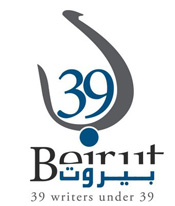 If there's one literary award that stole the imagination of young writers throughout the Arab world
in 2009, it was Beirut39. This remarkable project was launched in March 2009 by the distinguished
UK‒based Hay Festival—a literary institution already in existence for the past 22 years—
with the aim of celebrating the most exciting and promising 39 writers under the age of 40 in the Arab
world today. Nominations for the prize were requested from readers, publishers, literary agents, and
authors all across the Arab-speaking world and abroad. The result was an astonishing 500 entrants, which
had to be whittled down to just 39.
If there's one literary award that stole the imagination of young writers throughout the Arab world
in 2009, it was Beirut39. This remarkable project was launched in March 2009 by the distinguished
UK‒based Hay Festival—a literary institution already in existence for the past 22 years—
with the aim of celebrating the most exciting and promising 39 writers under the age of 40 in the Arab
world today. Nominations for the prize were requested from readers, publishers, literary agents, and
authors all across the Arab-speaking world and abroad. The result was an astonishing 500 entrants, which
had to be whittled down to just 39.
The only prerequisites were that the authors be of Arab descent, under 40, and they had to have at least one piece of work (fiction or poetry) published. Furthermore, their writing could be in any language provided it was affiliated with the Arab world.
The aim of the competition is in keeping with its successful predecessor, Bogotá39, in 2007, which identified and advocated 39 outstanding Latin American writers under the age of 40, and included Wendy Guerra, Pilar Quintana, and Guadalupe Nettel.
A panel of eminent judges, including Lebanese poet Mr. Abdo Wazen; Omani poet Mr. Saif Al Rahbi; Lebanese poet and novelist Ms. Alawiya Sobh; and Egyptian literary critic Dr. Gaber Asfour, selected the 39 winning authors. Besides the mostly Arabic entries, there were also submissions in Dutch, Spanish, Swedish, English, Italian, and French, demonstrating the wide range of talent and the areas of the globe into which Arab writers have penetrated already.
After a demanding and meticulous process of evaluation, the panel announced a diverse and noteworthy group of winners at the Frankfurt Book Fair in October 2009. Included in the group were 11 women, among them award-winning Egyptian poet Nagat Ali, who enthusiastically proclaims, "I am honored to be selected among an outstanding group of accomplished peers." The writers are unanimous in their excitement about the upcoming Hay Festival in Beirut from 15–18 April 2010, where they will participate in the festivities celebrating Beirut as the UNESCO World Book Capital.
The winners, who represent 14 Arab countries, have been invited to the enchanting city of Beirut, sometimes also referred to as "The Paris of the Middle East", where they will enjoy the rare opportunity of interacting with each other, and with readers and other writers, on a number of forums. Approximately 50 events are being planned around the city, in libraries, bookshops, cafes, universities, and schools, including a host of literary discussions, debates, and book readings. All the events will be free and open to the public, as the festival wishes to attract as diverse an audience as possible.
The 39 writers have already begun work on their contributions to an anthology of fiction and poetry, entitled Beirut39, which will be published worldwide in a number of languages including Arabic, English, French and Spanish, and will be available at the festival. It is hoped that the translated publications will increase access to contemporary Arab literature, writers and culture.
Independent literature festivals and literature in translation are particularly critical to Arab writers. Another of the winning authors, Lebanese novelist Hala Kawtharani, says, "A translated text is a bridge to the culture of the other, to different lifestyles, different values, to different worlds in a bigger world that is becoming smaller."
Literary awards in the Arab world have traditionally credited writers with established careers. According to Nagat Ali, "The recognition of young Arab authors is marginalised to the extent that, absurdly, awards for 'young writers' sometimes go to authors over 60 years old!" Commendably, Beirut39 chose to break with this tradition and opted to honor the multitude of new, emerging voices.
Recent times have indeed seen a proliferation of 20-somethings, like French-Algerian writer Faïza Guène, award-winning short story writer Randa Jarrar from Kuwait, and Syrian-born Dima Wannous, who have surfaced and broken with the stereotypical output, to critical acclaim. Guène was published in 22 countries at the age of 19, and was surprised that her book resonated with so many readers, in so many different contexts. Says the young talent, "It was an extraordinary experience! I wondered how my book, which seemed to me to have very particular French problems, found its place in so many different countries."
Beirut39 signifies an opportunity for these vibrant, innovative writers to be introduced to readers worldwide, which may be a step toward greater understanding in our modern multicultural world. Another Lebanese winner, Hyam Yared, says, "Writing is a great mirror for societies and for reflecting the unrevealed depth of the human being... exchanging eastern and western ideas and mentalities may well be one of the answers to the modern crisis and misunderstanding between two worlds that rarely meet." Perchance this exchange will strengthen social tolerance and initiate cultural dialogue, while also emphasizing universal human traits and experiences.
As these 39 gifted Arab men and women take the stage at this historic literary event in Beirut to showcase the modern
Arab experience, and as the world gathers to celebrate books and writing with them, one hopes that the aim of fostering
global interest in Arab writers and their work will be accomplished with overwhelming success.
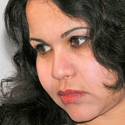 Nagat Ali was born in Cairo, Egypt in 1975. She earned an MA cum laude for her thesis, "The Irony in the Short Stories of Yusuf
Idriss", and is currently working on her PhD dissertation on "The narrator in the novels of Naguib Mahfouz". She has published two books
of poetry, of which Cracked Wall was awarded the Tangier Prize for Poetry in Morocco in 2009. A third book of poetry is scheduled
for publication in Beirut, in early 2010. Her poems have been translated into English, French, German and Kurdish. "Writing", she says,
"is like a predetermined fate; you find yourself compelled to write without making the decision to write."
Nagat Ali was born in Cairo, Egypt in 1975. She earned an MA cum laude for her thesis, "The Irony in the Short Stories of Yusuf
Idriss", and is currently working on her PhD dissertation on "The narrator in the novels of Naguib Mahfouz". She has published two books
of poetry, of which Cracked Wall was awarded the Tangier Prize for Poetry in Morocco in 2009. A third book of poetry is scheduled
for publication in Beirut, in early 2010. Her poems have been translated into English, French, German and Kurdish. "Writing", she says,
"is like a predetermined fate; you find yourself compelled to write without making the decision to write."

Najwa Binshatwan, a Libyan writer born in 1970, is author of the novel Madmun Burtuqali (2007), and two
collections of short stories Tifl Al-Waw (2006) and Qisas Laysat Lil-Rijal (2004). She says, "I am
constantly filled with questions that weigh me down and oblige me to write; because in writing, I find the answers
I seek to the unending stream of daily questions."
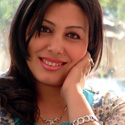
Mansoura Ez Eldin was born in Egypt in 1976. Her collection Dhaw'a Muhtaz (Shaken Light) was published in
Cairo in 2001. Her successful debut novel Maryam's Mazewas was published by the award-winning Merit publishers in 2004,
with the English edition published by AUC Press, Cairo. She has worked in Egyptian television, and presently runs the book
review section of the renowned Egyptian literary magazine Akhbar al-Adab (Literature News).
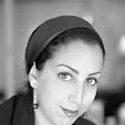
Faïza Guène was born in France in 1985 to Algerian parents. She wrote her first novel, Kiffe Kiffe
Demain (Just Like Tomorrow, in English) when she was 17 years old. It was a huge success in France, selling
over 360,000 copies and translation rights around the world. She's also the author of Du rêve pour les oufs
(published as Some Dream for Fools in the USA, and Dreams from the Endz in the UK) in 2006 and Les gens
du Balto in 2008.
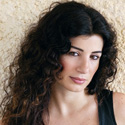 Joumana Haddad, born in Lebanon in 1970, is head of the cultural pages at the prestigious An Nahar newspaper, as
well as administrator of the IPAF literary prize (the 'Arab Booker') and the editor-in-chief of Jasad magazine,
a controversial Arabic magazine specialising in the literature and arts of the body. Her books include Time for a Dream
(1995), Invitation to a Secret Feast (1998), I Did Not Sin Enough (2003), Lilith's Return (2004),
Conversations with International Writers (2006), Death Will Come and It Will Have Your Eyes, an anthology
of 150 poets who committed suicide (2007).
Joumana Haddad, born in Lebanon in 1970, is head of the cultural pages at the prestigious An Nahar newspaper, as
well as administrator of the IPAF literary prize (the 'Arab Booker') and the editor-in-chief of Jasad magazine,
a controversial Arabic magazine specialising in the literature and arts of the body. Her books include Time for a Dream
(1995), Invitation to a Secret Feast (1998), I Did Not Sin Enough (2003), Lilith's Return (2004),
Conversations with International Writers (2006), Death Will Come and It Will Have Your Eyes, an anthology
of 150 poets who committed suicide (2007).
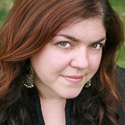
Randa Jarrar is an award-winning short story writer, novelist, and translator born in 1978. Her first novel, A Map
of Home, was released to critical acclaim in six languages, and won the Hopwood Award, the Gosling Prize and the Arab
American Book Award. She is at work on a new novel and a collection of short stories. She was raised in Kuwait and Egypt,
and moved to the US in 1991.
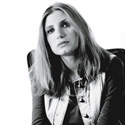
Hala Kawtharani was born in Beirut in August 1977. She studied political science and Arabic Literature at the
American University of Beirut. Her first novel, published in 2006, was Al-Ousbou' Al-Akhir (The Final Week)
followed by Studio Beirut in 2008. She publishes a weekly short story in the Beiruti magazine, Laha.
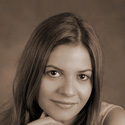
Dima Wannous was born in Damascus, Syria, in 1982. She is a journalist, writer and translator. A short story
collection of hers published in 2007 earned her the attention of literary critics. In 2008 she published her first novel,
A Chair. She presents a cultural TV show on a satellite network.
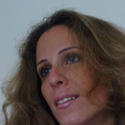
Hyam Yared was born in 1975 in Beirut. Poet and novelist, she has published two books of poetry with Dar An Nahar,
and two novels, L'Armoire des Ombres and Sous la Tonnelle. Her poetry has been translated into English and
Portuguese. Her books have received several awards, such as the France-Liban prize. She says, "I tell stories so I may
change the world. Writing is a painful getaway from generations of lies, towards truths. The only way to survive is to
always keep engaged, faithfully revealing what you need to however difficult it may be."
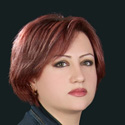
Rosa Yassin Hassan was born in Damascus, Syria, in 1974. She completed her degree in architecture in 1998. Her first
book of short stories was published in 2000, followed by a novel Ebony in 2004, which won the Hanna Mina Prize for
the Novel. It has been translated into German. She then wrote Negative, a novel about female political prisoners in
Syria, and her recent novel The Guardians of the Air was published in 2009.
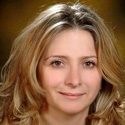
Samar Yezbek is a writer who also works in the media. She was born in the city of Jabla, Syria, in 1970. She has
published two books of poetry and three novels. She also writes screenplays for TV movies. Her Low Skies won best prize for
a TV screenplay in a UN competition.
Adania Shibli was born in Palestine in 1974 and has twice been awarded the Young Writer's Award in Palestine,
for her novels Masaas ("Touch") and Kulluna Ba'id Bethat al-Miqdar 'an al-Hub ("We Are All Equally Far From Love").
She has also written short stories and essays for literary magazines such as Al-Karmel in Palestine,
Al-Adaab and Zawaya in Lebanon, and Amkena in Egypt, among others. Shibli has a PhD in
media and cultural studies from the University of East London, in the UK.
This is a wonderful bouquet of accomplished women, with an award-winning streak among them. Let's keep an eye out for these gifted individuals, as they introduce us to their fascinating and diverse worlds. I certainly plan to!